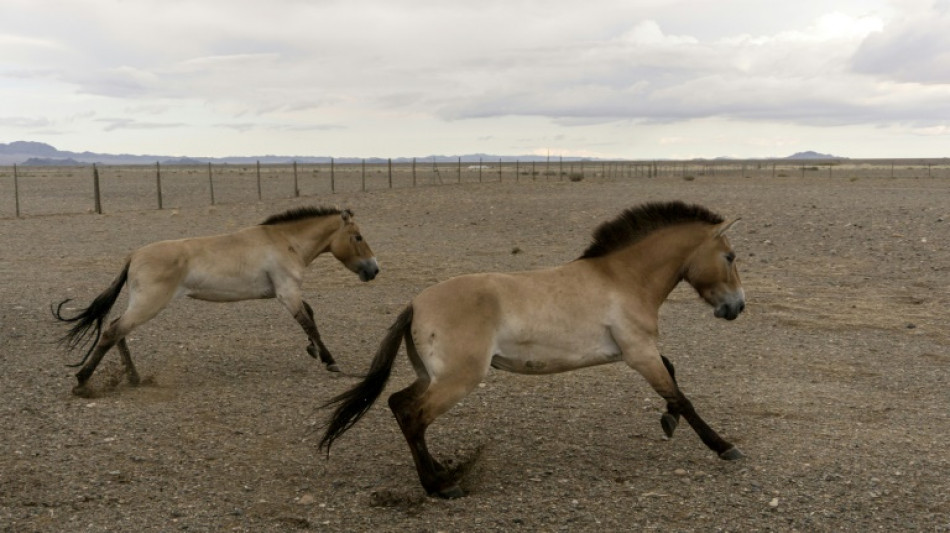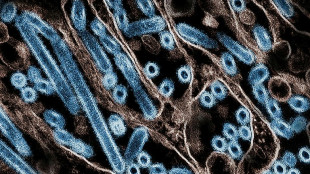
-
 Evenepoel targets return in time for Ardennes classics
Evenepoel targets return in time for Ardennes classics
-
Duffy bowls New Zealand to T20 victory over Sri Lanka

-
 Turkey's pro-Kurd party to meet jailed PKK leader on Saturday
Turkey's pro-Kurd party to meet jailed PKK leader on Saturday
-
Gaza hospital shut after Israeli raid, director held: health officials

-
 Surgery for French skier Sarrazin 'went well': federation
Surgery for French skier Sarrazin 'went well': federation
-
Mitchell, Bracewell boost New Zealand in Sri Lanka T20

-
 Kyrgios says tennis integrity 'awful' after doping scandals
Kyrgios says tennis integrity 'awful' after doping scandals
-
S. Korean prosecutors say Yoon authorised 'shooting' during martial law bid

-
 Vendee Globe skipper Pip Hare limps into Melbourne after dismasting
Vendee Globe skipper Pip Hare limps into Melbourne after dismasting
-
Reddy's defiant maiden ton claws India back into 4th Australia Test

-
 Doubles partner Thompson calls Purcell doping case 'a joke'
Doubles partner Thompson calls Purcell doping case 'a joke'
-
Reddy reaches fighting maiden century for India against Australia

-
 Sabalenka enjoying 'chilled' rivalry with Swiatek
Sabalenka enjoying 'chilled' rivalry with Swiatek
-
Political turmoil shakes South Korea's economy

-
 New mum Bencic wins first tour-level match since 2023 US Open
New mum Bencic wins first tour-level match since 2023 US Open
-
'Romeo and Juliet' star Olivia Hussey dies aged 73

-
 Brown dominates as NBA champion Celtics snap skid
Brown dominates as NBA champion Celtics snap skid
-
Indian state funeral for former PM Manmohan Singh

-
 France asks Indonesia to transfer national on death row
France asks Indonesia to transfer national on death row
-
Ambitious Ruud targets return to top five in 2025

-
 Late bloomer Paolini looking to build on 'amazing' 2024
Late bloomer Paolini looking to build on 'amazing' 2024
-
Australia remove Pant, Jadeja as India reach 244-7 at lunch

-
 Scheffler sidelined by Christmas cooking injury
Scheffler sidelined by Christmas cooking injury
-
Rice seeks trophies as Arsenal chase down 'full throttle' Liverpool

-
 Trump asks US Supreme Court to pause law threatening TikTok ban
Trump asks US Supreme Court to pause law threatening TikTok ban
-
Arsenal edge past Ipswich to go second in Premier League

-
 LawConnect wins punishing and deadly Sydney-Hobart yacht race
LawConnect wins punishing and deadly Sydney-Hobart yacht race
-
Ronaldo slams 'unfair' Ballon d'Or result after Vinicius snub

-
 Several wounded N.Korean soldiers died after being captured by Ukraine: Zelensky
Several wounded N.Korean soldiers died after being captured by Ukraine: Zelensky
-
Fresh strike hits Yemen's rebel-held capital

-
 Netflix with Beyonce make splash despite NFL ratings fall
Netflix with Beyonce make splash despite NFL ratings fall
-
Bird flu mutated inside US patient, raising concern

-
 Slovakia says ready to host Russia-Ukraine peace talks
Slovakia says ready to host Russia-Ukraine peace talks
-
Maresca challenges Chelsea to react to Fulham blow

-
 Tech slump slays Santa rally, weak yen lifts Japan stocks higher
Tech slump slays Santa rally, weak yen lifts Japan stocks higher
-
Test records for Zimbabwe and Williams as Afghanistan toil

-
 LawConnect wins punishing Sydney-Hobart yacht race
LawConnect wins punishing Sydney-Hobart yacht race
-
Barca's Yamal vows to 'come back better' after ankle injury

-
 Olmo closer to Barcelona exit after registration request rejected
Olmo closer to Barcelona exit after registration request rejected
-
Watching the sun rise over a new Damascus

-
 Malaysia man flogged in mosque for crime of gender mixing
Malaysia man flogged in mosque for crime of gender mixing
-
Montenegro to extradite crypto entrepreneur Do Kwon to US

-
 Brazil views labor violations at BYD site as human 'trafficking'
Brazil views labor violations at BYD site as human 'trafficking'
-
No extra pressure for Slot as Premier League leaders Liverpool pull clear

-
 Tourists return to post-Olympic Paris for holiday magic
Tourists return to post-Olympic Paris for holiday magic
-
'Football harder than Prime Minister' comment was joke, says Postecoglou

-
 Driver who killed 35 in China car ramming sentenced to death
Driver who killed 35 in China car ramming sentenced to death
-
Bosch gives South Africa 90-run lead against Pakistan

-
 French skier Sarrazin 'conscious' after training crash
French skier Sarrazin 'conscious' after training crash
-
NATO to boost military presence in Baltic after cables 'sabotage'

| RBGPF | 100% | 59.84 | $ | |
| BCC | -1.91% | 120.63 | $ | |
| SCS | 0.58% | 11.97 | $ | |
| BCE | -0.93% | 22.66 | $ | |
| RIO | -0.41% | 59.01 | $ | |
| CMSD | -0.67% | 23.32 | $ | |
| CMSC | -0.85% | 23.46 | $ | |
| NGG | 0.66% | 59.31 | $ | |
| GSK | -0.12% | 34.08 | $ | |
| RELX | -0.61% | 45.58 | $ | |
| JRI | -0.41% | 12.15 | $ | |
| BP | 0.38% | 28.96 | $ | |
| VOD | 0.12% | 8.43 | $ | |
| RYCEF | 0.14% | 7.27 | $ | |
| AZN | -0.39% | 66.26 | $ | |
| BTI | -0.33% | 36.31 | $ |

Prague, Berlin zoos to reintroduce wild horses to Kazakhstan
Prague zoo said Tuesday it would transport eight endangered wild horses to a Kazakhstan steppe in June in a joint project with the Tierpark Berlin zoo.
The zoos are planning to take at least 40 Przewalski's horses to roam free in the Altyn Dala (Golden Steppe) area in central Kazakhstan in the next five years.
In June, Czech army planes will transport three stallions and five mares to Arkalyk in central Kazakhstan, with Prague zoo and Tierpark Berlin sending four horses each.
"On June 3, two planes will take off, one from Prague and the other from Berlin, to take the horses to Arkalyk with stopovers in Istanbul and Baku," Prague zoo director Miroslav Bobek told reporters.
The 6,000-kilometre (3,750-mile) flight is expected to take 15 hours, said Czech army general Jaroslav Falta.
Provided by different zoos in Europe, the horses will then be driven from Arkalyk to the Alibi reintroduction centre in Altyn Dala on trucks.
Przewalski's horses have narrowly avoided extinction thanks to breeding programmes at zoos worldwide.
Prague Zoo, which has bred the species since 1932 and keeps the world genealogy book for the endangered species tracking all new births, launched a project to reintroduce the animals to Mongolia in 2011.
It transported 34 horses on Czech army planes there between 2011 and 2019, before the pandemic halted the project co-funded by zoos from across the globe.
"This project is vital for increasing the number of Przewalski's horses in the wild," European Association of Zoos and Aquaria (EAZA) chairman Endre Papp told reporters in Prague.
"What makes these reintroductions so valuable is not only the transport of the animals, but also the exchange of knowledge and expertise gained over the years," he added.
First documented by Russian scientist Nikolai Przhevalsky in 1881, the species was nearly extinct in the 1960s and is still listed as endangered by the International Union for Conservation of Nature.
The current global population exceeds 2,000 animals, with about half living in the wild in Mongolia, China and elsewhere.
Prague zoo is currently also planning a wild horse reintroduction project in eastern Mongolia.
P.Mira--PC




